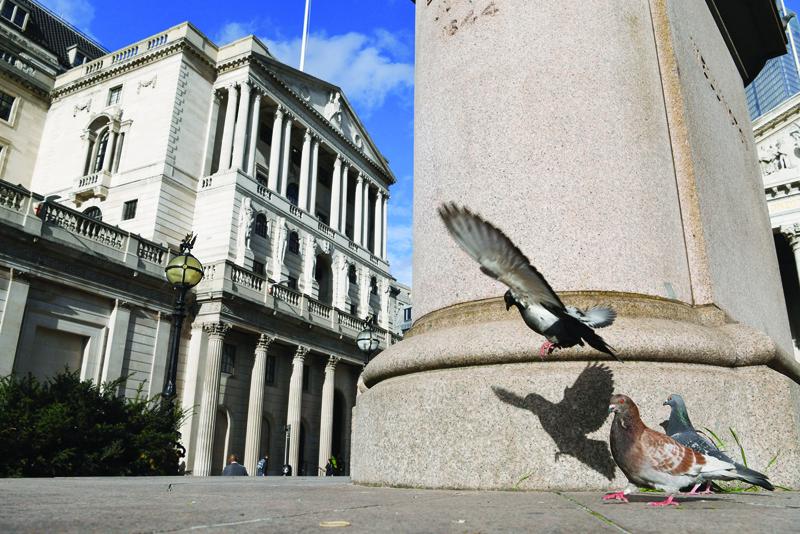LONDON: The Bank of England yesterday froze interest rates at a record-low but forecast a "temporary" inflation spike as the economy reopens, echoing warnings from the European Central Bank and the US Federal Reserve. The world's major central banks are grappling with fears of an inflationary spike, fuelled by commodity price gains, and worries over the health of post-COVID economic recovery.
The BoE's monetary policy committee (MPC) said in a statement that it held borrowing costs at 0.1 percent and also maintained the level of its stimulus measures-but warned inflation would likely top 3.0 percent. The pound dipped slightly against the dollar and euro after the news, which was in line with market expectations.
'Transitory' inflation bounce
"The committee's expectation is that the direct impact of rises in commodity prices on CPI inflation will be transitory," read minutes from the gathering. "More generally, the ... central expectation is that the economy will experience a temporary period of strong GDP growth and above-target CPI inflation, after which growth and inflation will fall back."
Consumer Prices Index (CPI) inflation was set to shoot further above the central bank's 2.0 percent official target. "Inflation is expected to pick up further above the target, owing primarily to developments in energy and other commodity prices, and is likely to exceed 3.0 percent for a temporary period," the BoE warned.
Both the Federal Reserve and ECB kept their own ultra-low rates and economic support measures intact in recent weeks, insisting also that high inflation would be temporary. UK inflation in May hit 2.1 percent-the highest level since before the pandemic-with clothing, fuel and oil prices rebounding as the economy gradually reopens. The BoE remains keen not to snub out any nascent economic recovery by raising rates too soon, following a raft of encouraging data for the period.
"The Committee does not intend to tighten monetary policy at least until there is clear evidence that significant progress is being made in eliminating spare capacity and achieving the 2.0 percent inflation target sustainably," it added yesterday. Inflation in Britain has nevertheless accelerated sharply since March, when the government began a phased lifting of coronavirus restrictions.
Outlook upgrade
The BoE also forecast Thursday that the UK economy would surge by 5.5 percent in the second quarter or three months to June, up from prior guidance of 4.25-percent growth. That would follow a 1.5-percent contraction in the first quarter. "Bank staff have revised up their expectations ... as restrictions on economic activity have eased," the minutes added. "This recovery in activity has been most pronounced in the consumer-facing services for which restrictions were loosened in April."
Under a phased reopening, bars and restaurants restarted outdoor dining in April and indoor services in May. Non-essential retailers meanwhile reopened their doors in April. The economy is set to fully reopen on July 19 after the government delayed the date by four weeks due to surging infections of the Delta variant of the coronavirus that causes COVID-19. The bank's chief task is to use monetary policy to keep inflation close to target, in order to preserve the value of money. - AFP



